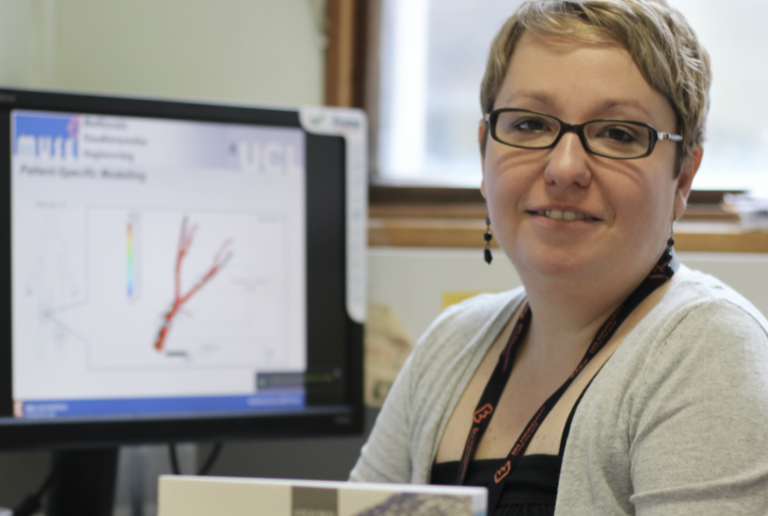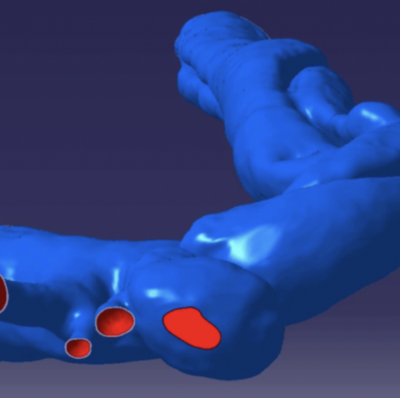#InspireAnEngineer: Spotlight on Dr Vanessa Diaz
8 March 2018
UK wide just one in ten engineers are women, the lowest rate in Europe. We want to change this.

As part of our year-long campaign to #InspireAnEngineer and as it is International Women’s Day on 8 March 2018, we will be featuring interviews with some of our women healthcare engineers this week. We want to highlight the ground-breaking work that they are doing advancing research frontiers and challenging stereotypes about what an engineer should like.
Dr Vanessa Diaz leads the Multiscale Cardiovascular Engineering (MUSE) group at UCL in applying mathematical tools and engineering principles to understand cardiovascular pathophysiology, in what is known as ‘patient-specific modelling’.
Vanessa develops patient-specific simulations and multiscale models that incorporate information about each individual, such as imaging and different biomarkers, in order to understand the specific cardiovascular health and disease for each patient and find the best treatment plan to fit them. She is interested in the application of these tools in the shift towards truly personalised medicine. Her work sits at the interface of cardiovascular science, mathematics and bioengineering, and is highly technical.
Is there a particular woman in the STEM field that has inspired you?
I really like the example set by Samantha Cristoforetti, that you might not know (but you totally should) who is an Italian European Space Agency astronaut, Italian Air Force pilot and engineer (mechanical engineer in fact!) amongst many other things. She is so incredibly accomplished and intelligent and has a great sense of humour.
I read somewhere that (apparently) her mum was on a mission when she was little to demonstrate that women were equals and capable of all sorts of scientific feats, hence she didn’t realize for many, many years that women did not rule the world. That is such a powerful thing. I hope I would be able to teach my little girl to be brave, work hard and dare to dream.
Now, to finish on a lighter but definitely not less important note, maybe you’d also like to know that Samantha was the first astronaut ever to brew an espresso coffee in space. What a beautiful story: an Italian astronaut finally getting a decent cup of coffee in space. It had to be done. It was destiny!
What is the most valuable lesson you’ve learnt during your career so far?
Merit will only take you so far. Promoting yourself is really important. That’s something I’m still working on.
What is the most challenging aspect of your research?
We are trying to do something rather unique by simulating on virtual patients, vascular diseases and conditions. These simulations take into account multi-scale patient-specific data (all sorts of biological, physiological and haemodynamic biomarkers). This is definitely much more difficult than image-based modelling and we need to rely a lot on our engineering training and knowledge to make valid assumptions. This requires VERY strong engineering skills, a fair amount of (good) judgement and a very good understanding of first principles.
I usually say we are the best Engineers of the Faculty (modesty above all!) because we get results with very little, often. This is because the data that we would ideally need is really scarce or doesn’t exist. There’s plenty of imaging data, but it’s much more difficult to get appropriate patient-specific biological and physiological data to inform our models. That’s when you need to be creative and quite good at what you do (if I can say so myself!).

Where do you see your field of research being in ten years, in terms of scientific developments and advances?
There is this big hope that data-driven science and ‘big data’ approaches are the answer to ‘predictive medicine’, but I personally believe that in order to fulfil this promise, at least for many complex diseases, we will need help from every corner! The complexity is too high.
Rich, coherent, longitudinal datasets at multiple biological and timescales are truly non-existent and that’s an issue that is not going to be solved any time soon, if ever. We will need ingenuity, a good old understanding of biology and the ability to formulate cause-effect relationships as well. I am really looking forward for people to see some sense and realise that both mechanistic and data-driven models will need to work together to get predictive medicine!
What challenges do you see for women in healthcare engineering?
This is still a male-dominated environment (as engineering and technical careers usually are) and I honestly despair sometimes at how hard we need to work to be taken seriously but things are changing. I must say that younger colleagues are usually much better than ‘old folk’ (but not all oldies are, ahem, dinosaurs, if I dare say!).
I have been asked, believe it or not, to go and ‘fetch’ a coffee for an ‘old boy’ in a meeting because he thought I was someone else’s assistant or to be in a project meeting only to be shown the first slide of a power point with a bunch of girls in bikinis with a big title ‘Let’s talk about models!’ (in case an ‘old boy’ is reading this, I must clarify that we were hoping to talk about, you know, mathematical models, as in equations and stuff). I remember that meeting well, I was with a young (female) researcher at the time and felt awful for her. First, I felt this absolute cold, white, fury. But then, my focus shifted from myself to my young, capable, enthusiastic and intelligent researcher and I thought: “How is she feeling now? How can I make her feel that her opinion (and mine) is important?” What happened there was very destructive. It can pulverise your confidence, just like that. One power point slide. That’s all it takes. As for myself, I’ve got a rather thick skin and I speak my mind (as many of my unfortunate colleagues would know!) but she was in shock (and I think to be ‘shocked’ is the only healthy reaction, to this, really). We worked through it but it is tough.
So, back to the question, in healthcare engineering or engineering in general really, we are a minority and the challenge is to have self-confidence and a strong sense of self-belief: you can achieve anything if you put your mind into in. But you need to believe it first.
 Close
Close

